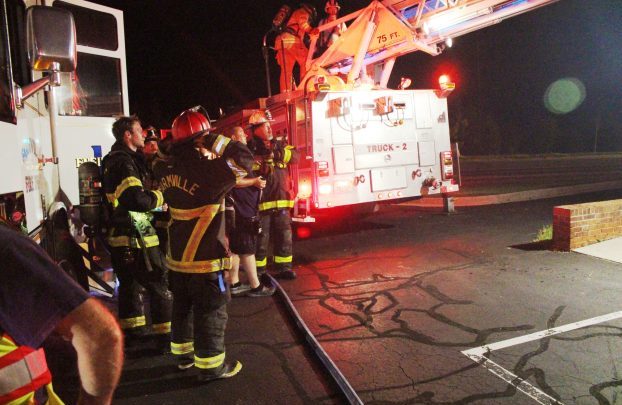Bartlett proposes FY20 budget
Published 1:03 pm Thursday, March 28, 2019
Prince Edward County Administrator Wade Bartlett presented his proposed Fiscal Year (FY) 2020 budget Tuesday evening to the county’s board of supervisors, highlighting a budget defined heavily by increased expenses, but increases that are neither expected to overwhelm the county nor result in any tax hikes.
As Bartlett noted in a PowerPoint presentation, the FY20 proposed budget comes to a total of $56,490,757, representing a 4.39 percent increase compared to the FY 2019 adopted budget, which came to a total of $54,115,969.

Wade Bartlett
The largest line items in Bartlett’s FY20 budget overview were school and general fund. The school allocation was listed at $26,080,279, a 4.49 percent increase from FY19, and the general fund allocation was listed at $23,003,156, a 3.7 percent increase.
Trending
There are three other seven-figure line items in the overview of the proposed budget. Social Services is slated to receive $3,196,620, representing the largest percent increase of any line item compared to FY19 — 8.2 percent. A total of $1,463,775 is designated for cafeteria, and solid waste is set to receive $1,447,115, the second-largest percent increase of any line item compared to FY19 — 6 percent.
The largest percent decrease of any line item compared to FY19 comes in the economic development category, which drops 53.9 percent from $43,368 to $20,000.
A slide entitled “Local Funding of School System” in Bartlett’s presentation indicated no change from 2018, with $8,440,984 slated for 2019. However, he elsewhere addresses the possibility of additional funding, which will be highlighted later in this article.
In a Wednesday interview, Farmville 701 District Supervisor and Board Chairman Jim Wilck provided insight into some of the increased expenses the county will be facing.
“For instance, we’ve got to chip in with the town and Longwood and Hampden-Sydney to buy some new ambulances, and I understand that I think they’re $250,000 apiece, and I’m sure that the town and county will contribute more than Longwood and Hampden-Sydney, so that’s new,” he said.
“There’s the salary increases that the state has talked about, and we’ll have to contribute to part of that,” he continued. “We’re going to have a 3 percent increase in the county salaries, I believe.”
Trending
He emphasized that these things have simply been talked about; nothing has been voted on yet.
 “And then, the remodeling costs of the courthouse, the remodeling of the STEPS building and the building of the Social Services building is going to cost us between $9 and $10 million,” Wilck said. “And obviously we don’t have that kind of money that we can just write a check for that, so for the first time in a number of years, we’re going to be borrowing money.”
“And then, the remodeling costs of the courthouse, the remodeling of the STEPS building and the building of the Social Services building is going to cost us between $9 and $10 million,” Wilck said. “And obviously we don’t have that kind of money that we can just write a check for that, so for the first time in a number of years, we’re going to be borrowing money.”
He also alluded to an increase related to the school budget.
On a slide in Bartlett’s presentation labeled “Challenges,” the county administrator lists 12 items. One of them is “Renovation of courthouse/STEPS,” and next to this item he simply lists, “cost unknown.” This is also the designation next to “Increased cost of elections.”
The largest amounts listed on the slide include $1.1 million for “Continuing jail cost,” $596,687 for “School board request for additional funding” and $237,000 for “Landfill capital costs.”
Wilck said he congratulated Bartlett on management of the FY20 budget that did not prompt any tax increases.
“I’m amazed,” Wilck said. “I really am. So, I complimented him on it. I think he did a great job.”
Wilck said that at Tuesday’s budget meeting, fire departments made a presentation.
“Most of them are happy with what they got last year, but two — Hampden-Sydney and Meherrin — both wanted some additional money,” he said.
He noted that in the case of the Hampden-Sydney Volunteer Fire Department, representatives indicated that about 90 percent of the department’s volunteers were students, and the yearly turnover in students made it difficult for the department to raise funds through events like other volunteer fire departments.
Reflecting on his proposed FY20 budget, Bartlett said, “I would agree with Chairman Wilck that increased expenses were a driving force in the new budget. But this force which could have overwhelmed us and other like communities was counterbalanced by past actions to control expenses and increase revenues by a focus on economic development.”
He cited that there were many factors that enabled the county to avoid tax hikes.
“The single largest factor were steps taken by the board of supervisors in FY 2015 when we went over the entire budget and reduced expenses by about $500,000,” he said. “While the county has always been frugal, as evidenced by our historically low real estate tax rate, this action set a tone for all of the department directors and constitutional officers, one in which expenses must be closely managed and controlled.”
“This mindset has continued over the last few years, not only in the county but in organizations of which we are part,” Bartlett continued. “The trends allowed me to decrease the amount needed for both jail and comprehensive services expenses by $100,000 each.”
He said that another past action that is paying dividends is the decision to become self-insured as it pertains to health insurance.
“While you have heard of health insurance increases in the double digits for others, the county’s have been around 5 percent each of the past two years,” he said.
“Finally the emphasis the board has placed on economic development is reaping dividends,” he continued. “The increasing number of businesses that have opened in Farmville and Prince Edward have caused revenues to jump. Not only are the businesses paying taxes, but the jobs they have created and the additional money that is churning through the local economy is generating additional revenue collections. This increased revenue was a key factor in allowing the budget to be balanced without a tax increase.”
As for the most challenging element of the budget to manage, Bartlett said it was the increase in expenses, “especially the costs associated with pay raises for both the teachers, constitutional offices and the county staff and the need to continue building our capacity to operate the landfill.”
Wilck pointed to a way the county is preparing for increased expenses and the need to borrow money when he highlighted how the board is rethinking its donations to Longwood University.
“We donate to the small business part of Longwood, and then we also donate to the Moton Museum, which is owned by Longwood,” he said. “And then we donate to the visual arts center downtown. And we decided to keep the visual arts center, because it’s a match situation. I think we give them a little over $3,000, and they get an extra ($3,000) to match it.
“But as far as the Moton and the small business thing, we decided it was kind of foolish for us to borrow money and then donate it to Longwood, because their budget’s twice what ours is, and as I say, look around at all the new buildings going up — Longwood’s not hurting for money.”






